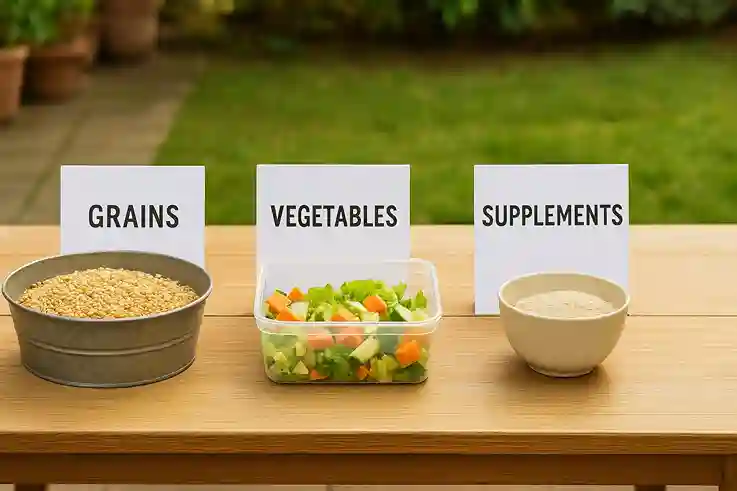Raising chickens for eggs is simple and rewarding. Fresh eggs taste better, cost less over time, and support sustainable living. Many families discover that keeping a small flock brings joy as well as nutrition. You gain more than breakfast. You learn where your food comes from, reduce waste, and even teach children responsibility. The process is straightforward once you understand the basics.
This guide will walk you through every step. You will learn how to choose the right breeds, set up a safe coop, feed your hens well, and care for them daily. You will also discover how to solve common problems and make raising chickens for eggs a family-friendly activity.
Why Try Raising Chickens for Eggs

Fresh eggs from your own flock taste richer and hold more nutrients than most store-bought options. Yolks appear brighter, and shells feel stronger because hens eat a varied diet. You enjoy food that is fresher and often healthier for your family.
Raising chickens also saves money over time. Once you set up a coop and buy feed, the cost per egg drops. Store prices fluctuate, but a steady supply from your backyard stays reliable. With every dozen collected, your flock pays you back in value.
Sustainability adds another advantage. Chickens recycle kitchen scraps, lowering household waste. Their manure enriches gardens naturally, reducing the need for chemical fertilizer. By raising chickens for eggs, you shrink your footprint and move toward self-reliance.
Choosing the Right Chicken Breeds
Selecting the right breed makes raising chickens for eggs easier. Beginner-friendly breeds such as Rhode Island Reds, Leghorns, and Plymouth Rocks lay consistently and adapt well to different settings. These hens provide a steady supply without demanding too much care.
Egg-laying breeds focus on high production, giving you many eggs each year. Dual-purpose breeds, however, balance egg laying with meat quality. Families often choose dual-purpose hens when they want both food sources in one flock.
Climate and space also matter. Cold-hardy breeds thrive in northern states, while heat-tolerant hens handle southern summers better. Small urban yards benefit from quieter, compact breeds, while rural spaces allow larger flocks. Matching breed to your environment ensures happier hens and reliable eggs.
Popular Chicken Breeds for Egg Production
| Breed | Egg Type & Output | Best For |
|---|---|---|
| Rhode Island Red | Large brown eggs, ~250/yr | Beginners, cold climates |
| Leghorn | White eggs, ~280/yr | High production, warm areas |
| Plymouth Rock | Brown eggs, ~200/yr | Families, mixed flocks |
| Sussex | Light brown eggs, ~250/yr | Backyard settings, kids |
| Orpington | Brown eggs, ~200/yr | Cold climates, dual-purpose |
Feeding Chickens for Better Eggs
Healthy hens lay better eggs. A balanced diet, constant water, and seasonal adjustments all support strong production.

Balanced Diet: Grains, Greens, and Calcium
Chickens thrive on variety. Grains such as corn and wheat supply energy. Protein-rich feeds support growth and keep hens strong. Fresh greens, garden scraps, and insects add vitamins to the diet. Calcium ensures strong shells. Crushed oyster shells or limestone can be placed in a separate feeder. With a balanced mix, hens stay active and eggs remain high in quality.
Clean Water Access at All Times
Water matters as much as feed. A hen may drink nearly a pint each day. Without steady access, egg production slows quickly. Keep waterers in shaded spots to maintain cool temperatures. In winter, use heated containers to prevent freezing. Clean containers often to block bacteria. Fresh water remains the simplest way to protect flock health.
Seasonal Feed Adjustments for Health
Seasons shape diet needs. In summer, provide extra greens and water-rich treats such as cucumbers. In winter, add more grains to give hens the calories they need for warmth. During molting, increase protein so feathers regrow quickly. With these adjustments through the year, hens stay productive and eggs remain abundant.
Daily Care for Your Flock
Simple daily routines keep hens healthy and egg supply steady. Consistent attention protects both flock and food quality.
Egg Collection and Storage Tips
Collect eggs at least once or twice daily. Frequent gathering prevents cracks, dirt, or pecking damage. Store clean eggs in a cool place, ideally a refrigerator. Avoid washing unless needed, since the natural shell coating protects freshness. If washing is required, use warm water and dry immediately. Proper handling keeps eggs safe and lasting longer.
Coop Cleaning Routine to Prevent Disease
A clean coop always leads to healthier birds. To begin, remove droppings daily and replace any wet bedding. Furthermore, plan a deep clean every few weeks by scrubbing roosts, nest boxes, and feeders. After cleaning, dry the area completely before adding fresh bedding. In addition, ensure good airflow, since ventilation lowers moisture and reduces harmful bacteria. As a result, clean spaces not only prevent disease but also protect overall egg quality.
Signs of Stress or Illness to Watch For
First, watch hens closely during daily chores, since even small changes can reveal bigger problems. For example, drooping wings, pale combs, or loss of appetite may point to illness. In addition, stress often shows in reduced egg laying or sudden aggression. Therefore, quick response matters. Isolate sick birds at once to stop the spread of disease. Also, check flock conditions such as feed, water, or crowding, since these can trigger stress. With steady observation, you can catch issues early, protect the flock, and maintain a reliable egg supply.
How to Earn Money from Raising Chickens for Eggs
Raising chickens for eggs can bring profit as well as fresh food. With a little planning, your flock can support household income.

Sell Fresh Eggs Locally
First, the most direct way to earn is by selling eggs. Neighbors, friends, and local markets usually prefer fresh eggs over store-bought ones. Moreover, unique shell colors from certain breeds, such as blue or speckled, often attract higher prices. Therefore, presentation matters. Always store eggs in clean cartons, keep them cool, and label them clearly. As a result, you build trust with buyers and encourage repeat sales.
Use Manure and Compost
Chicken manure is naturally rich in nutrients, which makes it valuable for gardeners. However, it must be composted before use to prevent burning plants. Once composted, it becomes safe, easy to handle, and highly effective. In addition, composted manure can be sold to local growers or community gardens. Alternatively, you can apply it to your own soil, which saves money on chemical fertilizers. As a result, this simple step turns waste into a useful and profitable resource.
Raise and Sell Chicks or Pullets
Another way to earn is by hatching and raising young chickens. Pullets, which are hens just about to start laying, often sell quickly because new keepers prefer fast results. In addition, chicks can be sold to hobbyists or small farms looking to expand their flocks. However, this option requires more space, time, and specialized knowledge. Therefore, it is best suited once you feel confident managing your flock and have the setup to care for young birds properly. As a result, selling pullets or chicks can become a profitable side venture beyond egg sales.
Offer Educational Experiences
Finally, many families today are curious about homesteading and backyard farming. By offering small workshops or guided farm visits, you can teach others while also earning extra income. Moreover, visitors gain hands-on skills and leave with a stronger appreciation for fresh, local food. In turn, this option builds community connections and strengthens trust. As a result, workshops not only create additional revenue but also increase demand for your eggs and related products.
👉 “For official U.S. guidelines on organic poultry care and certification, check the USDA Organic Livestock and Poultry Standards available through the Agricultural Marketing Service.”
Potential Egg Income by Flock Size
| Number of Hens | Eggs per Week (avg) | Dozens per Month | Income per Month ($4/dozen) | Income per Year |
|---|---|---|---|---|
| 5 | ~25 | ~8 dozen | $32 | ~$380 |
| 10 | ~50 | ~16 dozen | $64 | ~$750 |
| 15 | ~75 | ~25 dozen | $100 | ~$1,200 |
| 20 | ~100 | ~33 dozen | $132 | ~$1,575 |
Other Advantages of Raising Chickens for Eggs
Beyond food and income, raising chickens for eggs brings several powerful benefits that support modern lifestyles.

Enjoy Organic, Healthier Eggs
Today, many families want eggs that are free from chemicals and additives. By raising your own flock, you directly control what your hens eat and how they live. Consequently, you can avoid synthetic feeds or harmful treatments. In addition, a varied natural diet produces richer yolks and stronger shells. As a result, you enjoy eggs that are not only organic but also fresher, tastier, and healthier for the whole family.
Reduce Household Waste
Chickens naturally recycle food that might otherwise end up in the trash. For example, kitchen scraps such as vegetable peels, fruit rinds, and leftover grains quickly become part of their diet. Therefore, almost nothing goes to waste. In addition, the flock produces manure that transforms into nutrient-rich compost. As a result, you not only cut down on household trash but also reduce disposal costs while creating a useful resource for your garden.
Support Sustainable Farming
Keeping hens at home directly supports a more sustainable food system. Instead of relying on large-scale farms, you produce eggs right in your own backyard. Moreover, this reduces the need for long-distance transportation, packaging, and storage. Each egg collected locally lowers your overall environmental footprint. In addition, backyard flocks encourage eco-friendly habits such as composting and waste reduction. As a result, raising chickens for eggs helps create a greener and more resilient community food network.
Explore a New Career Path
Finally, even a small backyard flock can open the door to new opportunities. At first, you might sell eggs, compost, or simple farm tours for extra income. Over time, these activities can grow into a steady side business. Moreover, many keepers discover that their hobby sparks a deeper passion for agriculture. As a result, what begins as a small project at home can eventually develop into a rewarding full-time farming career.
Raising Chickens for Eggs: Family Fun
Raising chickens for eggs can be more than food or income. It can also bring families closer together.
Involving Kids in Safe Chicken Care
Children can take part in simple tasks such as feeding hens, gathering eggs, or refilling water. However, these chores must always be supervised to keep both kids and chickens safe. In addition, children often enjoy observing flock behavior and learning how animals grow. As a result, these daily tasks help shape them into responsible young farmers. Caring for chickens becomes both educational and fun.
Building Responsibility and Farm Skills
Daily chicken care teaches discipline and routine. Kids learn the importance of consistency by feeding hens, cleaning the coop, and collecting eggs on time. Moreover, these activities build practical farm skills, from basic animal care to understanding food cycles. As young farmers, they gain confidence through hands-on work and see the direct results of their efforts. Therefore, a small flock becomes more than a chore—it serves as a living classroom in the backyard.
Enjoying Fresh Eggs Together at Home
Finally, families can enjoy the most rewarding part: fresh eggs on the table. Cooking breakfast with eggs collected just hours earlier always feels special. In addition, the shared experience of raising chickens makes every meal more meaningful. As a result, the flock provides not only nutrition but also memories that last. Furthermore, these early experiences can inspire children to see farming not just as a hobby, but also as a possible career path in the future.
Benefits of Raising Chickens for Eggs in the Backyard
Backyard flocks provide more than fresh food. They also deliver health, financial, and environmental rewards.
Fresh and Nutritious Eggs
First, the biggest benefit is access to fresh, organic eggs right at home. Backyard eggs often have richer yolks, stronger shells, and higher nutritional value compared to store-bought. In addition, you know exactly how your hens are raised and what they eat, which gives peace of mind about quality and safety.
Lower Food Costs Over Time
Keeping a small flock can noticeably reduce household grocery bills. At first, the coop, feeders, and quality feed require an investment. However, once those essentials are in place, the steady supply of organic backyard eggs quickly offsets the costs. Moreover, unlike store prices that rise with demand or inflation, home-produced eggs remain consistent and affordable. As a result, a flock offers both savings and financial stability in the long run.
Reduced Food Waste
Backyard chickens naturally recycle food that would otherwise be thrown away. Vegetable peels, fruit scraps, stale bread, and leftover grains all become part of their diet. Therefore, fewer kitchen leftovers end up in the trash. In addition, the flock produces manure that can be composted into a nutrient-rich soil booster. As a result, household waste is reduced, gardens thrive with natural fertilizer, and nothing goes to waste.
Environmental Sustainability
Finally, every egg collected in your backyard reduces dependence on large-scale farms. Unlike store-bought eggs, backyard eggs require no packaging, long-distance transport, or heavy processing. Moreover, hens raised at home can thrive on natural diets and kitchen scraps, which lowers the need for chemical feeds. As a result, the environmental impact is smaller, and resources are used more efficiently. Therefore, raising chickens for eggs directly supports greener choices and more sustainable living.
Backyard vs. Store-Bought Eggs
| Feature | Backyard Eggs | Store-Bought Eggs |
|---|---|---|
| Freshness | Collected daily, eaten within days | Often stored for weeks before sale |
| Nutritional Value | Richer yolks, stronger shells, more nutrients | Varies by brand and handling |
| Organic Control | Diet and care fully controlled at home | May include additives or treatments |
| Cost Over Time | Lower after initial setup costs | Prices fluctuate with the market |
| Waste Reduction | Kitchen scraps recycled into eggs/compost | Packaging waste and transport impact |
| Sustainability | Less transport, no heavy packaging | Relies on large-scale farming |
| Community Impact | Builds family bonds and local networks | Limited connection to source |
“If you’ve broken the eggs, you should make the omelette.” — Sir Robert Anthony Eden
Frequently Asked Questions (FAQ)
Conclusion
Raising chickens for eggs is simple, rewarding, and full of lasting benefits. From enjoying organic, farm-fresh eggs to saving money and reducing waste, a small backyard flock can make a big difference. Moreover, the experience brings families closer, teaches children valuable skills, and even opens the door to new income opportunities.
In addition, every egg collected at home supports sustainable living. Less packaging, fewer food miles, and more control over what your hens eat all contribute to a greener lifestyle. Therefore, whether you are motivated by health, savings, or community, chickens offer an accessible path toward self-reliance.
Finally, remember that success comes with patience, care, and observation. Start small, learn as you go, and enjoy the journey. With time, raising chickens for eggs can grow from a simple household project into a source of pride, purpose, and even profit.
Now it’s your turn — would you try raising chickens for eggs in your own backyard? Share your thoughts or experiences in the comments below!

Michael Reyes is a versatile blogger with a primary focus on farming and sustainable living. Growing up close to nature, he developed a deep interest in agriculture and enjoys sharing practical tips on backyard farming, modern cultivation techniques, and eco-friendly practices. While farming remains his specialty, Michael also writes on a wide range of topics, from lifestyle and travel to everyday inspiration, making his work relatable to a broad audience.
Outside of writing, Michael enjoys spending time outdoors, experimenting with new farming methods, and exploring different cultures through food and travel. His approachable voice and well-researched insights make his blogs both informative and engaging.


